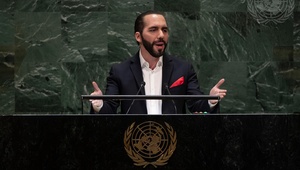New investigative podcast by UNU-MERIT alumnus narrates the story of this contentious policy

Nayib Armando Bukele, President of the Republic of El Salvador, addresses the general debate of the General Assembly’s seventy-fourth session. UN Photo/Laura Jarriel
In 2021, El Salvador became the first country in the world to declare bitcoin as an official currency alongside the U.S. dollar. But almost two years after this law came into effect, the initiative remains a failure. Bitcoin has barely been adopted by the population and the country is nearly 30 percent down in its cryptocurrency investment. [1]
So why did the Salvadoran government think its Bitcoin policy was a good idea? Over the past year and a half, I have conducted a journalistic investigation to try and answer this question. The result is a narrative podcast in Spanish, produced by Mantel and fact-checked by Diplomacia Activa, called Plan Cuscatlán: de las Pandillas al Bitcoin (Plan Cuscatlán: From the gangs to the Bitcoin [2]). It is a documentary about how the Bitcoin experiment in El Salvador impacted the local population and its financial system. I believe this is an important question, given that two-thirds of the Salvadoran population doesn’t have access to basic financial services. In fact, in June 2021, President Nayib Bukele championed this crypto adventure under the flag of financial inclusion, highlighting that 70 percent of the population was unbanked.
Has the Bitcoin policy helped turn this situation around? The short answer is no. Research published by the National Economic Bureau of Economic Research showed that those who downloaded the official government app to buy Bitcoin – the Chivo Wallet – already had bank accounts and were also young, male and educated. Furthermore, a poll conducted by the University Institute of Public Opinion (IUDOP) from Universidad Centroamericana José Simeón Cañas showed that seven out of ten Salvadorans think that the Bitcoin law should be repealed. [3]
Another goal for the policy was to disintermediate the country’s remittances industry, as nearly 24 percent of its 2022 GDP came from remittances. The idea was to spare the population from paying fees by fostering crypto adoption. However, the numbers from El Salvador’s Central Bank indicate that only 1.7 percent of the Salvadorans who sent money from abroad in 2022 did so via cryptocurrencies.
How Bitcoin became law
Citizens of El Salvador first heard the news that bitcoin would become legal tender in their home country on 5 June 2021. It was a moment of great confusion. President Bukele made the announcement in English in a pre-recorded video reproduced during a presentation from a crypto entrepreneur at the 2021 Miami Bitcoin Conference. Details on how this initiative was going to be implemented or to what extent were almost non-existent. There was not even a press conference following the announcement.
The news was hard to swallow for the population due to recent memories of economic trauma related to the Salvadoran currency. In 2001, the country underwent a sudden process of dollarization. In theory, El Salvador became a republic with a double circulation of currency – the colón and the US dollar. In practice, however, people stopped using the colón and all operations are carried out in dollars. When the Bitcoin policy was announced, the local population feared a repeat of this story with cryptocurrency. In September 2021, a protest erupted against this law and other government initiatives aimed at dismantling the independence of the judicial system. Nevertheless, the Bitcoin policy remained untouched and democracy kept deteriorating.
As I dug deeper, I was puzzled by this question: How is it possible that a government as popular as that of President Bukele –with a 93 percent approval rating in June 2023– would continue to insist on a failed policy that most of the Salvadoran people are against? To try to find an explanation, I spoke with several sources from each side of the debate.
Mónica Taher, former Director of International Technological and Economic Affairs at El Salvador’s Secretariat of Trade and Investment, told me in an interview that she believes it is too early to assert that the Bitcoin policy has failed. According to her, the benefits of the Bitcoin law will appear in the long term, once we observe “how maybe El Salvador is going to lead a domino effect worldwide with respect to the traditional monetary system.” Ms. Taher also praised this legislation for attracting new companies to the country, although this is a contested argument.
Mario Gómez is a digital activist who has publicly opposed the Bitcoin legislation since its early days, even to the point of being jailed for expressing his opinion on Twitter, though his captivity lasted less than a day. (He was released shortly after public outrage over his detention started to spread across social media.) He currently lives in exile, and we spoke via video conference. “The Bitcoin issue is just the visible face of the pile of policies that have been […] imposed in an authoritarian way in El Salvador”, he said.
His hypothesis is that the Bitcoin adventure is an attempt to legitimise globally questioned cryptocurrency firms in a friendly jurisdiction. He argues that, maybe, ‘‘the reason we have all these big crypto operators in El Salvador is because the moment they receive an investigation from the Department of Justice in the U.S. or a European regulatory entity, the [local] government can protect them.” This refers in large part to the fully acknowledged regulatory advisory role that Bitfinex – one of the most important global cryptocurrency exchanges – provides to the Salvadoran government. [4] Most recently, Binance –the world’s largest cryptocurrency exchange– also announced that it became the first fully licensed crypto exchange in El Salvador.
According to the official narrative, there are areas where this policy has proven a success. President Bukele – a former publicist – argues that Bitcoin rebranded the country. El Salvador, the smallest country in Central America –formerly known as the most dangerous country in the world–, is now famous as the country of Bitcoin. [5]
President Bukele also often presents Bitcoin as a symbol of economic freedom. However, other types of freedom are clearly disregarded in El Salvador. In March 2022, for instance, the government approved an exception of all constitutional guarantees in a top-down effort to eradicate gangs, resulting in more than 70,000 people being detained without due process (and only around 5,000 of those were released by mid-May 2023). That is why Nelson Rauda, one of the Salvadoran journalists who covered the Bitcoin story the most, told me in an interview: “It is ridiculous that for having access to Bitcoin [the government] wants to present El Salvador as a country of freedoms. And it would be funny, if only not so many people’s lives were being affected.”
The Salvadoran government showed no intentions so far to reconsider its Bitcoin policy, even though it failed to achieve its objectives (except for, allegedly, rebranding the country). Contrary to what President Bukele was hoping [6], no other government has followed through in imitating this idea. However, the opposite has happened to its equally controversial security policy to combat local gangs, which is growing increasingly popular throughout the region. Most certainly, Bukele’s influence grew larger than Bitcoin in Latin America.
……………………………………………………………………………………………………
The five-episode podcast Plan Cuscatlán: de las Pandillas al Bitcoin is a brief story of how this Bitcoin policy happened and what it meant for El Salvador, based on our own independent research and interviews conducted with 12 sources, including leading journalists, crypto entrepreneurs, experts from economic, technological and historical fields, civil society activists, NGOs and a public official. All except for one were Salvadoran voices.
Listen to the first episode here (available only in Spanish):
About the creators of the podcast
Plan Cuscatlán: de las Pandillas al Bitcoin (Cuscatlán Plan: from the Gangs to the Bitcoin) is a production of Mantel. The documentary was conducted by Leopoldo Pérez Obregón, MPP graduate with over six years of experience as a capital markets lawyer and regulator in Argentina. He currently works as Digital Communications Officer at UNU-MERIT.
REFERENCES
[1] President Bukele claims that no money was lost on Bitcoin since the country didn’t sell any of the Bitcoin it bought.
[2] In 2019, then-Salvadoran presidential candidate Nayib Bukele presented “Plan Cuscatlán“, an outline of his objectives and goals for his term as president of El Salvador. Cuscatlán was the name of El Salvador before the Spanish conquest and colonization of the country.
[3] Most recently, the IMF also cautioned governments against granting legal tender status to crypto assets. That relates to the risks they present to government finances and financial stability.
[4] This is a company that raises serious transparency concerns. Especially over one of its products called Tether, one of the largest cryptocurrencies in existence. The value of the Tether is pegged to the US Dollar, but the company refuses to provide reliable information and perform independent audits on the quality of the assets backing the Tether’s value.
[5] In September 2022, President Nayib Bukele opened his speech at the seventy-fourth United Nations General Assembly with the following statement: ‘I am bringing you greetings from the land of volcanoes, of surf, coffee, bitcoin and freedom.’ In that very same speech, he once again remarked that El Salvador, once famous as one of the most dangerous countries in the world, is now renowned for its ‘’beaches, for its surf, for its volcanoes, for its financial freedom, for its good government and for having put an end to organized crime.’’
[6] Bukele stated in an article of his authorship in the Bitcoin Magazine, that ‘For those who understand, the real question is not if other countries are going to adopt bitcoin, but when’.
ANY COMMENTS?
NOTA BENE
The opinions expressed here do not necessarily reflect the views of UNU.
MEDIA CREDITS
Images: UN Photo/Laura Jarriel and Laura Capra




